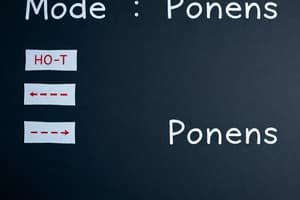Podcast
Questions and Answers
What is a conditional statement?
What is a conditional statement?
A statement written in 'if then' form.
What is the hypothesis of a conditional statement?
What is the hypothesis of a conditional statement?
The 'if' part of a conditional statement.
What is the conclusion of a conditional statement?
What is the conclusion of a conditional statement?
The 'then' part of a conditional statement.
What is a counter example?
What is a counter example?
What is the converse of a conditional statement?
What is the converse of a conditional statement?
What is the inverse of a conditional statement?
What is the inverse of a conditional statement?
What is the contrapositive of a conditional statement?
What is the contrapositive of a conditional statement?
What is a biconditional statement?
What is a biconditional statement?
Study Notes
Conditional Statements and Related Concepts
- A conditional statement is expressed in "if then" form, linking a hypothesis to a conclusion.
- The hypothesis refers to the "if" part of the conditional statement, setting the condition for the conclusion.
- The conclusion represents the "then" part, which follows if the hypothesis holds true.
Counter Example
- A counter example demonstrates a scenario where the hypothesis is true but the conclusion is false, disproving the conditional statement.
Variations of Conditional Statements
- The converse of a conditional statement is formed by switching the hypothesis and conclusion, represented as "if q, then p."
- The inverse involves negating both the hypothesis and conclusion, expressed as "if not p, then not q."
- The contrapositive switches and negates both parts of the conditional statement, formulated as "if not q, then not p."
Biconditional Statement
- A biconditional statement occurs when both the conditional statement and its converse are true, typically expressed as "p if and only if q."
Studying That Suits You
Use AI to generate personalized quizzes and flashcards to suit your learning preferences.
Description
This quiz covers key concepts related to conditional statements, including definitions of terms like hypothesis, conclusion, and counter examples. Use this resource to deepen your understanding of logical reasoning and argument structures in mathematics. Perfect for students learning about logic and proofs.




